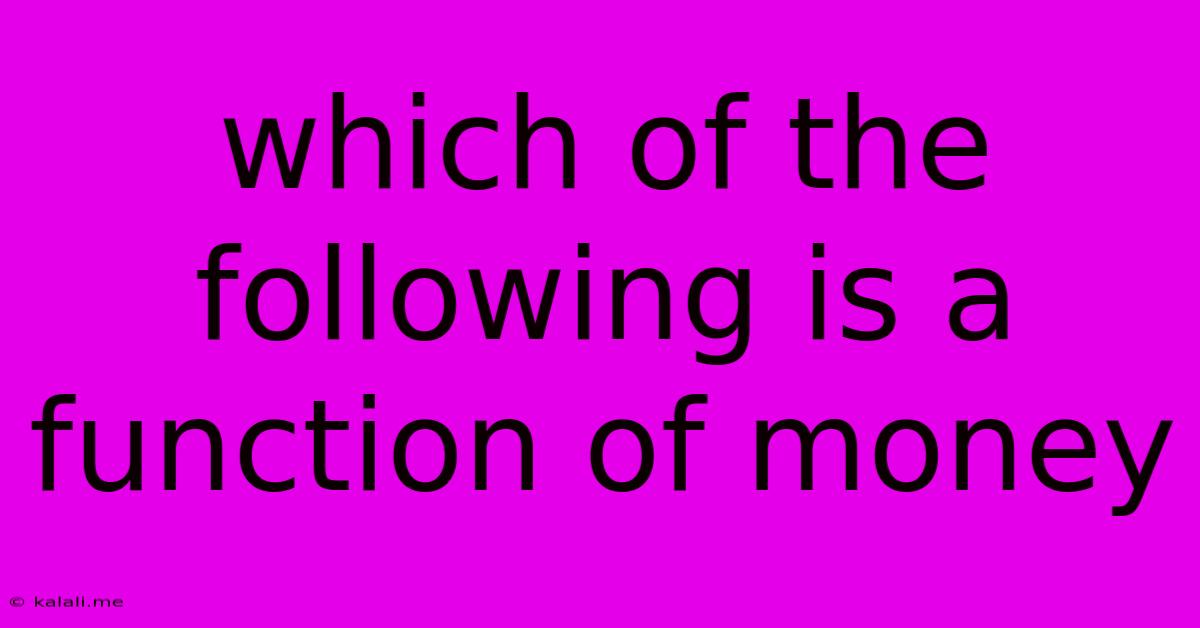Which Of The Following Is A Function Of Money
Kalali
Jun 14, 2025 · 3 min read

Table of Contents
Which of the Following is a Function of Money? A Deep Dive into the Roles of Money in an Economy
Money. We use it every day, but have you ever stopped to consider its fundamental roles within our economic system? This article will explore the core functions of money and how it facilitates the smooth operation of our markets. Understanding these functions is crucial for anyone seeking to grasp basic economic principles. This exploration will answer the question: which of the following is a function of money, and will provide a comprehensive overview of the topic.
What is Money? Before delving into the functions, let's briefly define what we mean by "money." In simple terms, money is anything widely accepted as a medium of exchange for goods and services. This could take various forms, from physical currency like coins and banknotes to digital representations such as bank balances and electronic payment systems.
The Three Primary Functions of Money:
Money serves three key functions within an economy:
-
1. Medium of Exchange: This is arguably the most crucial function. Money acts as an intermediary in transactions, eliminating the need for bartering. Imagine trying to trade your carpentry skills for groceries – a cumbersome process. Money simplifies this, allowing for seamless exchange. Without a universally accepted medium of exchange, trade would be significantly hampered and economic growth stifled. This function is fundamental to a functioning market economy. The efficiency gained through this function cannot be overstated.
-
2. Unit of Account: Money provides a common standard for measuring the value of goods and services. This standardization allows for easy comparison and facilitates economic calculations. Without a unit of account, comparing the value of, say, a kilogram of apples and a pair of shoes would be incredibly difficult. Prices are expressed in monetary units, enabling consumers and businesses to make informed decisions. This aspect simplifies accounting, budgeting, and financial planning.
-
3. Store of Value: Money allows individuals to store purchasing power over time. This means you can save your earnings today and use them to purchase goods and services in the future. While the value of money can fluctuate due to inflation or deflation, it generally serves as a relatively reliable store of value compared to other assets that may depreciate more rapidly. This function is vital for saving, investment, and long-term financial planning. This allows individuals and businesses to plan for the future with more certainty.
Beyond the Basics: Secondary Functions of Money
While the three functions above are considered primary, money also performs several secondary functions:
-
Standard of Deferred Payment: Money facilitates borrowing and lending. Loans and credit agreements are denominated in monetary units, making it possible to repay debts over time. This function supports various financial instruments and contributes to economic expansion.
-
Facilitating International Trade: While different countries may use different currencies, money allows for the exchange of goods and services across international borders, promoting global trade. This is often facilitated through foreign exchange markets.
Which of the following IS a function of money? (Example Scenarios)
Let's consider some example scenarios to illustrate which options are indeed functions of money:
- Scenario A: A farmer trades a bushel of wheat for a pair of shoes. This is not a function of money (this is bartering).
- Scenario B: A worker receives a paycheck for their services. This demonstrates the medium of exchange function.
- Scenario C: A store lists the price of a shirt as $25. This showcases the unit of account function.
- Scenario D: A person saves part of their income in a savings account. This highlights the store of value function.
In conclusion, money serves multiple crucial roles within an economy. Its primary functions as a medium of exchange, unit of account, and store of value are essential for the smooth operation of markets and economic growth. Understanding these functions provides a foundational understanding of economic principles and financial systems.
Latest Posts
Latest Posts
-
Differentiate Between Monohybrid Cross And Dihybrid Cross
Jun 15, 2025
-
Which Of The Following Are True About Language
Jun 15, 2025
-
Select Whats True About Object Oriented Databases
Jun 15, 2025
-
Number Of Valence Electrons In Chlorine Ion Are
Jun 15, 2025
-
The Most Common Site For Taking A Pulse Is The
Jun 15, 2025
Related Post
Thank you for visiting our website which covers about Which Of The Following Is A Function Of Money . We hope the information provided has been useful to you. Feel free to contact us if you have any questions or need further assistance. See you next time and don't miss to bookmark.